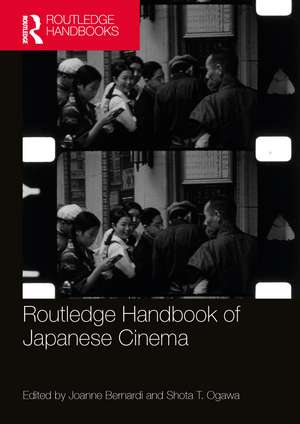Routledge Handbook of Japanese Cinema
Editat de Joanne Bernardi, Shota T. Ogawaen Limba Engleză Paperback – aug 2022
The volume’s twenty-one chapters represent work by authors with diverse backgrounds and expertise, recasting traditional questions of authorship, genre, and industry in broad conceptual frameworks such as gender, media theory, archive studies, and neoliberalism. The volume is divided into four parts, each representing an emergent area of inquiry:
- "Decentring Classical Cinema"
- "Questions of Industry"
- "Intermedia as an Approach"
- "The Object Life of Film"
This handbook will prove a useful resource to students and scholars of Japanese studies, film studies, and cultural studies more broadly.
| Toate formatele și edițiile | Preț | Express |
|---|---|---|
| Paperback (1) | 427.98 lei 6-8 săpt. | |
| Taylor & Francis – aug 2022 | 427.98 lei 6-8 săpt. | |
| Hardback (1) | 1559.20 lei 6-8 săpt. | |
| Taylor & Francis – 10 aug 2020 | 1559.20 lei 6-8 săpt. |
Preț: 427.98 lei
Nou
Puncte Express: 642
Preț estimativ în valută:
81.90€ • 87.57$ • 68.28£
81.90€ • 87.57$ • 68.28£
Carte tipărită la comandă
Livrare economică 18 aprilie-02 mai
Preluare comenzi: 021 569.72.76
Specificații
ISBN-13: 9780367528188
ISBN-10: 0367528185
Pagini: 396
Ilustrații: 38
Dimensiuni: 174 x 246 mm
Greutate: 0.73 kg
Ediția:1
Editura: Taylor & Francis
Colecția Routledge
Locul publicării:Oxford, United Kingdom
ISBN-10: 0367528185
Pagini: 396
Ilustrații: 38
Dimensiuni: 174 x 246 mm
Greutate: 0.73 kg
Ediția:1
Editura: Taylor & Francis
Colecția Routledge
Locul publicării:Oxford, United Kingdom
Public țintă
Postgraduate and UndergraduateCuprins
Introduction Part 1: Decentering Classical Cinema: Modernity, Translation, and Mobilization 1. Suspense and Border Crossing: Ozu Yasujirō’s Crime Melodrama 2. Beyond Mt. Fuji and the Lenin Cap: Identity Crisis in Taniguchi Senkichi’s Akasen kichi (The Red Light Military Base, 1953) 3. Home Movies of the Revolution: Proletarian Filmmaking and Counter-Mobilization in Interwar Japan 4. When Marnie Was There: Female Friendship Film and the Genealogy of Queer Girls Culture 5. Making Sense of Nakai Masakazu’s Film Theory, "Kino Satz" 6. Geysers of Another Nature: The Optical Unconscious of the Japanese Science Film Part 2: Questions of Industry: Critical Studies of Regulatory Frameworks, Creative Labor, and Distributive Networks 7. Kaiju Films as Exportable Content: Reassessing the Function of the Japanese Film Export Promotion Association 8. “Fugitives” from the Studio System: Ikebe Ryō, Sada Keiji, and the Transition from Cinema to Television in the Early 1960s 9. Solo Animation in Japan: Empathy for the Drawn Body 10. Media Models of "Amateur" Film and Manga Part 3: Intermedia as an Approach: Tracing Genealogies across Disciplines and Media 11. Utsushie: Japanese Magic Lantern Performance as Pre-cinematic Projection Practice 12. "Inter-Mediating" Global Modernity: Benshi Film Narrators, Multisensory Performance, and Fan Culture 13. Between Silent and Sound: The Liminal Space of the Japanese "Sound Version" 14. Marionettes No Longer: Politics in the Early Puppet Animation of Kawamoto Kihachirō 15. Rhetorics of Autonomy and Mobility in Japanese "AAA" Games: The Metal Gear Solid and Resident Evil Series within a Global Media Context 16. Pointing Through the Screen: Archiving, Surveillance, and Atomization in the Wake of Japan’s 2011 Triple Disasters Part 4: The Object Life of Film: Site-Specific Approaches to Japanese Cinema Studies 17. A Historical Survey of Film Archiving in Japan 18. Japanese Film History and the Challenges of IMAGICA WEST Corp. 19. A Case Study of Japanese Film Exhibition in North America: The Japan Society, New York 20. Regional Film Archive in Transit: Yasui Yoshio and Kobe Planet Film Archive 21. New Paths toward Preserving Japanese Cinema: The Toy Film Museum Backstory
Notă biografică
Joanne Bernardi is Professor of Japanese/Film and Media, University of Rochester. Her background includes East Asian Studies, film preservation, filmmaking, and photography. She directs the Re-Envisioning Japan DH Project; publications include Japanese and silent cinema, film historiography, screenwriting, material culture, tourism, popular culture, and digital humanities.
Shota T. Ogawa is Assistant Professor of Cinema Studies at Nagoya University, Japan. With a background in Visual and Cultural Studies, his research interests include postcolonial hybridity in Japanese cinema, tourism and travel films in imperial Japan, and trans-cultural migration of passing narratives.
Shota T. Ogawa is Assistant Professor of Cinema Studies at Nagoya University, Japan. With a background in Visual and Cultural Studies, his research interests include postcolonial hybridity in Japanese cinema, tourism and travel films in imperial Japan, and trans-cultural migration of passing narratives.
Descriere
The Routledge Handbook of Japanese Cinema provides a timely and expansive overview of Japanese cinema today, through cutting-edge scholarship that reflects the hybridity of approaches defining the field.
